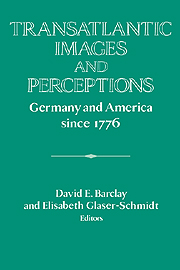Book contents
- Frontmatter
- Introduction
- 1 “Through a Glass, Darkly”: Changing German Ideas of American Freedom, 1776-1806
- 2 “Germans Make Cows and Women Work”: American Perceptions of Germans as Reported in American Travel Books, 1800-1840
- 3 Weary of Germany - Weary of America: Perceptions of the United States in Nineteenth-Century Germany
- 4 “Auch unser Deutschland muss einmal frei werden”: The Immigrant Civil War Experience as a Mirror on Political Conditions in Germany
- 5 Different, But Not Out of This World: German Images of the United States Between Two Wars, 1871-1914
- 6 From Cultureto Kultur : Changing American Perceptions of Imperial Germany, 1870-1914
- 7 The Reciprocal Vision of German and American Intellectuals: Beneath the Shifting Perceptions
- 8 Germany and the United States, 1914-1933: The Mutual Perception of Their Political Systems
- 9 Between Hope and Skepticism: American Views of Germany, 1918-1933
- 10 “Without Concessions to Marxist or Communist Thought”: Fordism in Germany, 1923-1939
- 11 The Continuity of Ambivalence: German Views of America, 1933-1945
- 12 Cultural Migration: Artists and Visual Representation Between Americans and Germans During the 1930s and 1940s
- 13 Representations of Germans and What Germans Represent: American Film Images and Public Perceptions in the Postwar Era
- 14 Chancellor of the Allies? The Significance of the United States in Adenauer's Foreign Policy
- 15 American Policy Toward German Unification: Images and Interests
- 16 Unification Policies and the German Image: Comments on the American Reaction
- Index
4 - “Auch unser Deutschland muss einmal frei werden”: The Immigrant Civil War Experience as a Mirror on Political Conditions in Germany
Published online by Cambridge University Press: 05 January 2013
- Frontmatter
- Introduction
- 1 “Through a Glass, Darkly”: Changing German Ideas of American Freedom, 1776-1806
- 2 “Germans Make Cows and Women Work”: American Perceptions of Germans as Reported in American Travel Books, 1800-1840
- 3 Weary of Germany - Weary of America: Perceptions of the United States in Nineteenth-Century Germany
- 4 “Auch unser Deutschland muss einmal frei werden”: The Immigrant Civil War Experience as a Mirror on Political Conditions in Germany
- 5 Different, But Not Out of This World: German Images of the United States Between Two Wars, 1871-1914
- 6 From Cultureto Kultur : Changing American Perceptions of Imperial Germany, 1870-1914
- 7 The Reciprocal Vision of German and American Intellectuals: Beneath the Shifting Perceptions
- 8 Germany and the United States, 1914-1933: The Mutual Perception of Their Political Systems
- 9 Between Hope and Skepticism: American Views of Germany, 1918-1933
- 10 “Without Concessions to Marxist or Communist Thought”: Fordism in Germany, 1923-1939
- 11 The Continuity of Ambivalence: German Views of America, 1933-1945
- 12 Cultural Migration: Artists and Visual Representation Between Americans and Germans During the 1930s and 1940s
- 13 Representations of Germans and What Germans Represent: American Film Images and Public Perceptions in the Postwar Era
- 14 Chancellor of the Allies? The Significance of the United States in Adenauer's Foreign Policy
- 15 American Policy Toward German Unification: Images and Interests
- 16 Unification Policies and the German Image: Comments on the American Reaction
- Index
Summary
In this chapter, evidence from immigrant letters is used to address the following question: How did German immigrants in the era before 1871 regard the political situation in their homeland? How widespread was the “spirit of 1848,” and, above all, how deeply did it extend down into the rank and file? How were political opinions and preferences concerning the United States, on the one hand, and Germany or Europe, on the other, interrelated, particularly in the Civil War era? This question extends to political partisanship, disposition toward the war effort itself, and toward the race issues that emerged from it. What effect did the confession, education, and social origins of immigrants have on their views? All these questions are closely interwoven with another issue, the degree to which emigration was politically motivated in the first place.
There are a number of works that skirt around the edges of these questions, but none that really gets at its center. Peter Marschalck has estimated that only a few thousand of the emigrants in the aftermath of 1848 were politically motivated. But as other scholars and I have argued, economic and political grievances were often closely intertwined, and at least a rudimentary political consciousness was much more widespread among immigrants than is often realized.
- Type
- Chapter
- Information
- Transatlantic Images and PerceptionsGermany and America since 1776, pp. 87 - 108Publisher: Cambridge University PressPrint publication year: 1997
- 3
- Cited by



